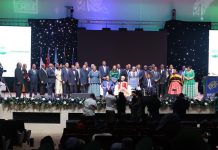Africa-Press – Eswatini. It was nearly midnight in Lagos when Timilehin Ayantunji logged off from yet another one-on-one mentorship call. His mentee, an aspiring developer in Nairobi, had just landed her first freelance contract. Her voice shook with gratitude. “I didn’t think someone like me could do this,” she said. Timilehin smiled, not out of surprise but recognition. He had been there too.
Just a few years earlier, Timilehin was a self-taught coder, hunched over a borrowed laptop in a crowded apartment, cobbling together knowledge from YouTube tutorials and free GitHub repositories. There was no roadmap. No mentor. Just trial, error, and an unshakable belief that tech could be a passport to something bigger.
By day, Timilehin is a Senior Frontend Engineer at eTranzact, one of Africa’s leading payment providers. His code helps power the infrastructure behind millions of transactions across web, mobile, and POS platforms, mission-critical systems where a single error could cost millions.
But while his engineering work drives digital payments, his true passion lies in building something more intangible: people. “The way we build software, scalable, resilient, is how we should build people too,” he explains. “Give them a solid foundation, and they’ll scale themselves.”
The Talent Gap That Sparked a Movement
Africa’s tech sector is booming, but access to quality education and mentorship has long lagged behind. Just a few years ago, access to structured tech education in Africa was scarce. A 2021 report by Google and the IFC found that over half of Africa’s 700,000 professional developers were self-taught, navigating a fragmented learning ecosystem without structured training or formal mentorship.
The result? Brilliant minds such as Timileyin burned out before they ever broke through.
Timilehin knew that struggle intimately. In his early years, he faced unreliable internet access, long power outages, and the constant challenge of balancing self-learning with the demands of work and family. He often spent nights debugging code by candlelight, relying on outdated tutorials and free resources that left more questions than answers. Rejections were common, opportunities rare, and mentors even rarer.
“When I was starting out, I didn’t just need information; I needed someone to believe in me,” he says. Instead of waiting for that system to change, he built it himself.
From Writing Code to Closing The Knowledge Gap
At eTranzact, one of Africa’s leading payment solution providers, Timilehin Ayantunji plays a key role in building the digital infrastructure behind millions of daily transactions. The company processes payments across POS, web, mobile, and card systems, serving businesses and consumers across several African countries and the UK. In this high-stakes environment, reliability and precision aren’t optional; they’re the product. With over four years of experience designing secure, high-performing frontend systems, Timilehin ensures that every interface he builds translates complex financial operations into seamless user experiences. His engineering work supports real-time payments, transaction integrity, and compliance, reinforcing trust in a financial ecosystem where downtime can cost millions.
For Timilehin, that same principle of reliability extends beyond software; it applies to people. The systems he builds mirror the mentorship philosophy he lives by: give others a strong foundation, and they’ll scale on their own. Global Impact, Local Purpose
Timilehin’s influence extends far beyond Nigeria’s borders; it’s global. Through ADPList, one of the world’s largest mentorship platforms connecting professionals across 140+ countries, he has mentored developers, founders, and tech professionals from Nigeria, the United Kingdom, the United States, Canada, and Kenya. Over the course of 102 one-on-one sessions and more than 3,000 minutes of mentorship, his guidance has helped aspiring engineers land jobs, build products, and gain confidence to thrive in the global tech ecosystem.
His impact hasn’t gone unnoticed. Timilehin ranks among the Top 5% of mentors globally and is recognised as one of the Top 10 mentors in Africa.. The recognition places him among a class of professionals whose mentorship footprint cuts across continents, industries, and generations.
For Timilehin, mentorship has never been about recognition. “The best way to grow the ecosystem is to make growth easier for others,” he says. That philosophy guides his work with initiatives such as the IT Skills Center and Wave, programs focused on strengthening Africa’s digital workforce. These initiatives, supported by global organisations including the Ford Foundation, Mercy Corps, and Expo 2020 Dubai, aim to expand access to technology education and create pathways for sustainable employment across the continent.Harnessing the Potential of Africa’s Digital Turning Point
Africa’s digital economy is approaching a defining inflexion point. According to the African Union’s Digital Transformation Strategy for Africa (2020–2030), the continent is projected to create over 230 million digital jobs by the end of the decade. But while the numbers are promising, the infrastructure for talent development remains uneven. Traditional education models, often outdated and inaccessible to many, simply cannot produce skilled professionals at the pace required by this fast-moving economy. For Timilehin, mentorship is the bridge across that gap. “Access and exposure are everything,” he explains. “When you create those two things, you accelerate growth, not just for individuals, but for entire industries, he believes.”
As global attention turns to Africa as the next frontier of digital innovation, a new generation of technologists is reshaping how the continent builds for its future. By connecting global learning models with local realities, they are developing solutions that are both world-class and deeply rooted in the needs of their communities. Across cities like Lagos, Nairobi, and Accra, young engineers are proving that the next wave of African tech leadership will not wait for opportunity to arrive. They are creating it and ensuring others rise with them. In his words, “The next generation of African tech leaders won’t wait for opportunity,” Timilehin says. “They’ll create it, and bring others along with them.”
For More News And Analysis About Eswatini Follow Africa-Press







